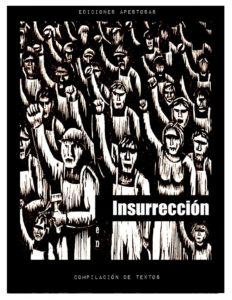by Penelope Nin
It is rumored that we (a “we” not well-defined whose lack of definition suits the rumor-mongers) have nothing to do with anarchism, being in reality nihilists disguised for the purpose of penetrating into the sanctuary of anarchy with bad intentions. It is noted that one who takes up the task of guarding the temple ends up seeing thieves everywhere, and maybe the hour has come to quiet “our” troubled detractors.
First of all, they must explain what they mean by nihilism. Personally, I view anyone who extols the joys of nihilism to me with suspicion because I consider nihilism, as the substantiation of nothing, to be a deception. When the incompleteness of all is cultivated with a feeling of fullness, it is difficult to resist the temptation to replace the old absolute with its most abstract moment in which nothing is immediately transformed into all and is therefore totalized. Ultimately, nihilism seems to me to be a crafty form of reasoning, that drives the whole structure of knowledge into the darkness of Nothingness only to receive, through this spectacular, radical negation, still more of the light of the All.









